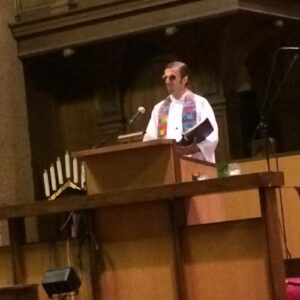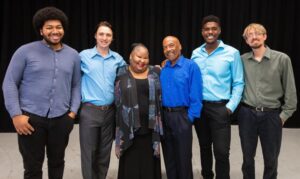Next year will be the 10th anniversary of the premiere of my chamber opera, Heaven Down Here. The work portrays Jim Jones and worship at Peoples Temple on an imaginary day in San Francisco, a day which would be the last for many of its members before moving to Guyana.

Composing the piece and organizing the performance was a years-long journey. I documented my reflections in several jonestown report articles throughout the process. The entire June 2014 performance is now also viewable on YouTube, with notes about the piece and my approach in the description.
In explaining why I have not produced or composed more large-scale works since then, I often cite the immense burden in managing logistics and fundraising that I took on in order to perform Heaven Down Here. But confronting the disturbing Peoples Temple story and the sheer magnitude of the loss in the massacre took an emotional toll, and that was also a factor.
Nevertheless, what I learned creating Heaven Down Here shows up in all my subsequent work.

I wanted my chamber opera to have a musical sound that captured the sounds of People Temple worship, particularly from the Black church. Gospel music and Black worship traditions are a central part of my own musical background. But I also searched for a sound that captured the unconventionally-radical vision that drew many to Peoples Temple. I believe their boundary-breaking spirit offered hope to its members. But the disregard for norms, frequently led by white men in positions or power in Peoples Temple (especially Jones himself) made their radical experimentation extremely dangerous. It amounted to an escape from accountability, and left those in power in a position to cause serious harm.
I consider myself an experimental musician. Having just completed the master’s program in composition at Oakland’s Mills College when I wrote Heaven Down Here, I thought of my own radical musical work in the same way I understood the radical theology at Peoples Temple. I felt my intentionally dissonant chords and unusual textures and melodic structures invited new and exciting ways of listening. Yet too often, in seeing this music performed, it felt like white straight cisgender male musicians like me were crossing boundaries and appropriating material in a way that only we could get away with, without examining our own bias, potentially at others’ expense. Our often provocative, abstract, and intellectualized experiments in sound became the sort of “white noise” that masked sounds and voices from marginalized communities.
I thought it would be important to struggle with this radical “avant-garde” sound in the musical language of Heaven Down Here. It would be presented in conversation with songs and rhythms of the Black church. I began referring to this sound as Avant-gospel.
After Heaven Down Here, I claimed this term – avant-gospel – to describe my entire aesthetic. As I continue to build musical worlds where avant-garde experimentation and Black gospel can be in conversation with one another, the lessons from Heaven Down Here and the Peoples Temple story offer my most valuable insight. It became clear to me that avant-gospel must not simply be a merger of genres, but a practice of rebalancing power in a communal space, away from those in positions of power and privilege who have the capacity to cause harm when unchecked, in favor of the voices that we tend to ignore and silence.
I do not want to oversimplify the influences on Jim Jones’ behavior, but I cannot help but wonder what would have happened if he spent a little less time adapting worship songs for his own glorification, and a little more time allowing the music of African American faith – music that has represented resistance to white supremacy from its origin – to challenge himself. I find many white people in power can experience the intensity of expression in Black worship and gospel music as itself dissonant and provocative. What if Jones, honoring a presumably beloved tradition to many of his Black parishioners, had just spent more time singing a song like “Fix Me, Jesus”? I can’t imagine things would have ended quite the same way.

My commitment remains to work within the ethics of avant-gospel in everything I do. This past December, I served as inaugural music director for Lorraine Hansberry Theater’s Halie! The Mahalia Jackson Musical in San Francisco and keyboardist for a production of Regina Taylor’s Crowns, centered around women in the Black church. As a white person, any integrity I may have found in my over 15 years playing, working, and building relationships in gospel music and Black churches can only have come from the avant-gospel principles of humility, accountability, and acknowledgement of the privilege and positions of power I often end up in, principles that I learned in composing Heaven Down Here.

My avant-gospel vision for intentionally radical and unconventional musical and aesthetic dialogue in the spirit of accountability to Black spiritual aesthetics may be most visible in my work arranging spirituals and gospel songs for In the Water and Heard the Voice, two albums with Edgetone Records. But this vision also deeply informs my current work with Darnell Ishmel, as well as Soyinka Rahim, and her BIBOLOVE spiritual practice rooted in her Black queer experience. The principles of avant-gospel also gave me a sense of vision for more recent solo projects, with the hope of creating dissonance that could specifically afflict the comfortable parts of ourselves who are complacent with traditions that are rooted in white supremacy, in the polytonal mashups as deconstruction of established musical material. And I think it led me into the vulnerable and uncharted territory of improvisation, and navigating experimentation and accountability in real time, in #1000improvisations, my three years of live daily keyboard improvisations – beginning here – since the start of the COVID-19 pandemic.
While it may have been necessary for me to move away from working with Heaven Down Here and Peoples Temple directly, I hope I will always hold onto how it has helped me grow as a person and as a musician, and I hope it will continue to guide my work, and perhaps even serve as a model for others working in arts, activism, and community building.
(Andrew Jamieson may be reached at AndrewBarnesJam@gmail.com.)